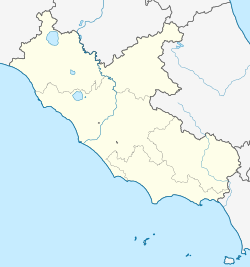Musarna is an Etruscan settlement located approximately 10 km west of Viterbo, Italy.[1] The site was discovered in 1849 and has been the site of excavations carried out by the École française de Rome since 1983.[2]
 | |
| Location | Comune di Viterbo, Italy |
|---|---|
| Region | Lazio |
| Coordinates | 42°24′43.9848″N 11°58′35.673″E / 42.412218000°N 11.97657583°E |
| Type | Settlement |
| History | |
| Cultures | Etruscan |
| Site notes | |
| Excavation dates | 1983-present |
| Archaeologists | Henri Broise; Vincent Jolivet |
| Condition | ruined |
| Public access | no |
During the Hellenistic period the settlement was surrounded by a fortification wall.[3]
The third century BC stone sarcophagus of Larth Thvetlie, son of Arnth, is housed in the University of Pennsylvania Museum of Archaeology and Anthropology.[4][5]
Sources
edit- Andreau, Jean, H. Broise, V. Jolivet et al. ed. 2002–present. Musarna. [series]. Rome: École française de Rome.;
- de Cazanove, O., V. Jolivet. 1984. "Musarna (Viterbe). La cité étrusque" MEFRA 96:530-4.
References
edit- ^ Harris, W., DARMC, R. Talbert, S. Gillies, T. Elliott, J. Becker (8 October 2021). "Places: 413217 (Musarna)". Pleiades. Retrieved December 29, 2014.
{{cite web}}: CS1 maint: multiple names: authors list (link) - ^ Broise, H. and V. Jolivet. 1997. "Musarna (Viterbe). Le site étrusco-romain." MEFRA 109:443-48.
- ^ Lorenzo Quilici (1 January 2001). Fortificazioni antiche in Italia: età repubblicana. L'ERMA di BRETSCHNEIDER. pp. 69–. ISBN 978-88-8265-158-9.
- ^ Jean MacIntosh Turfa (1 January 2011). Catalogue of the Etruscan Gallery of the University of Pennsylvania Museum of Archaeology and Anthropology. University of Pennsylvania Press. pp. 55–. ISBN 978-1-934536-25-4.
- ^ http://www.penn.museum/collections/object/63978 Sarcophagus MS3488A
42°24′43.9848″N 11°58′35.673″E / 42.412218000°N 11.97657583°E
